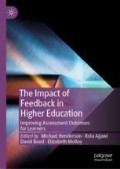Abstract
This chapter focuses on influences, affordances and challenges for teachers in designing for (and identifying) feedback impact. We propose four key questions that need to be asked: Do learners know the purpose of feedback and their role(s) in it? Can learners make sense of the information? Can learners take action? What effects should we be looking for? We then explore strategies that have been shown to be valuable in designing feedback that makes a difference. These are organised according to three important considerations: creating opportunities for effective feedback; developing learner and teacher capacities; and looking for effects. We finish the chapter by taking a step back and considering the implications at the programme and institutional levels in cultivating feedback that makes a difference.
Access this chapter
Tax calculation will be finalised at checkout
Purchases are for personal use only
References
Ajjawi, R., & Boud, D. (2018). Examining the nature and effects of feedback dialogue. Assessment & Evaluation in Higher Education, 43(7), 1106–1119. https://doi.org/10.1080/02602938.2018.1434128.
Barton, K., Schofield, S., McALeer, S., & Ajjawi, R. (2016). Translating evidence-based guidelines to improve feedback practices: The interACT case study. BMC Medical Education, 16(53), 1–12. https://doi.org/10.1186/s12909-016-0562-z.
Bearman, M., Dawson, P., Boud, D., Bennett, S., Hall, M., & Molloy, E. (2016). Support for assessment practice: Developing the Assessment Design Decisions Framework. Teaching in Higher Education, 21(5), 545–556. https://doi.org/10.1080/13562517.2016.1160217.
Bloxham, S., & Campbell, L. (2010). Generating dialogue in assessment feedback: Exploring the use of interactive cover sheets. Assessment & Evaluation in Higher Education, 35(3), 291–300.
Boud, D., & Molloy, E. (2013a). Rethinking models of feedback for learning: The challenge of design. Assessment & Evaluation in Higher Education, 38(6), 698–712. https://doi.org/10.1080/02602938.2012.691462.
Boud, D., & Molloy, E. (Eds.). (2013b). Feedback in higher and professional education. London: Routledge.
Broadbent, J., Panadero, E., & Boud, D. (2018). Implementing summative assessment with a formative flavour: A case study in a large class. Assessment & Evaluation in Higher Education, 43(2), 307–322. https://doi.org/10.1080/02602938.2017.1343455.
Carless, D., & Boud, D. (2018). The development of student feedback literacy: Enabling uptake of feedback. Assessment & Evaluation in Higher Education, 43(8), 1315–1325. https://doi.org/10.1080/02602938.2018.1463354.
Carless, D., Salter, D., Yang, M., & Lam, J. (2011). Developing sustainable feedback practices. Studies in Higher Education, 36(4), 395–407.
Dawson, P., Boud, D., Henderson, M., Phillips, M., Molloy, E., & Ryan, T. (2018). What makes for effective feedback: Staff and student perspectives. Assessment and Evaluation in Higher Education. https://doi.org/10.1080/02602938.2018.1467877.
Esterhazy, R., & Damşa, C. (2019). Unpacking the feedback process: An analysis of undergraduate students’ interactional meaning-making of feedback comments. Studies in Higher Education, 44(2), 260–274. https://doi.org/10.1080/03075079.2017.1359249.
Evans, C. (2013). Making sense of assessment feedback in higher education. Review of Educational Research, 83(1), 70–120.
Fritz, C. O., Morris, P. E., Bjork, R. A., Gelman, R., & Wickens, T. D. (2000). When further learning fails: Stability and change following repeated presentation of text. British Journal of Psychology, 91, 493–511.
Hattie, J., & Timperley, H. (2007). The power of feedback. Review of Educational Research, 77(1), 81–112.
Molloy, E., & Bearman, M. (2019). Embracing the tension between vulnerability and credibility: ‘Intellectual candour’ in health professions education. Medical Education, 53(1), 32–41. https://doi.org/10.1111/medu.13649.
Nicol, D. (2010). From monologue to dialogue: Improving written feedback processes in mass higher education. Assessment & Evaluation in Higher Education, 35(5), 501–517.
Nicol, D., & Macfarlane-Dick, D. (2006). Formative assessment and self-regulated learning: A model and seven principles of good feedback practice. Studies in Higher Education, 31(2), 199–218.
Ossenberg, C., Henderson, A., & Mitchell, M. (2019). What attributes guide best practice for effective feedback? A scoping review. Advances in Health Sciences Education, 24(2), 383–401. https://doi.org/10.1007/s10459-018-9854-x.
Rowe, A. D. (2017). Feelings about feedback: The role of emotions in assessment for learning. In D. Carless, S. M. Bridges, C. K. Y. Chan, & R. Glofcheski (Eds.), Scaling up assessment for learning in higher education (pp. 159–172). Singapore: Springer.
Rust, C. (2002). The impact of assessment on student learning: How can the research literature practically help to inform the development of departmental assessment strategies and learner-centred assessment practices? Active Learning in Higher Education, 3(2), 145–158.
Tai, J., Ajjawi, R., Boud, D., Dawson, P., & Panadero, E. (2018). Developing evaluative judgement: Enabling students to make decisions about the quality of work. Higher Education, 76(3), 467–481. https://doi.org/10.1007/s10734-017-0220-3.
Author information
Authors and Affiliations
Corresponding author
Editor information
Editors and Affiliations
Rights and permissions
Copyright information
© 2019 The Author(s)
About this chapter
Cite this chapter
Henderson, M., Molloy, E., Ajjawi, R., Boud, D. (2019). Designing Feedback for Impact. In: Henderson, M., Ajjawi, R., Boud, D., Molloy, E. (eds) The Impact of Feedback in Higher Education. Palgrave Macmillan, Cham. https://doi.org/10.1007/978-3-030-25112-3_15
Download citation
DOI: https://doi.org/10.1007/978-3-030-25112-3_15
Published:
Publisher Name: Palgrave Macmillan, Cham
Print ISBN: 978-3-030-25111-6
Online ISBN: 978-3-030-25112-3
eBook Packages: EducationEducation (R0)

